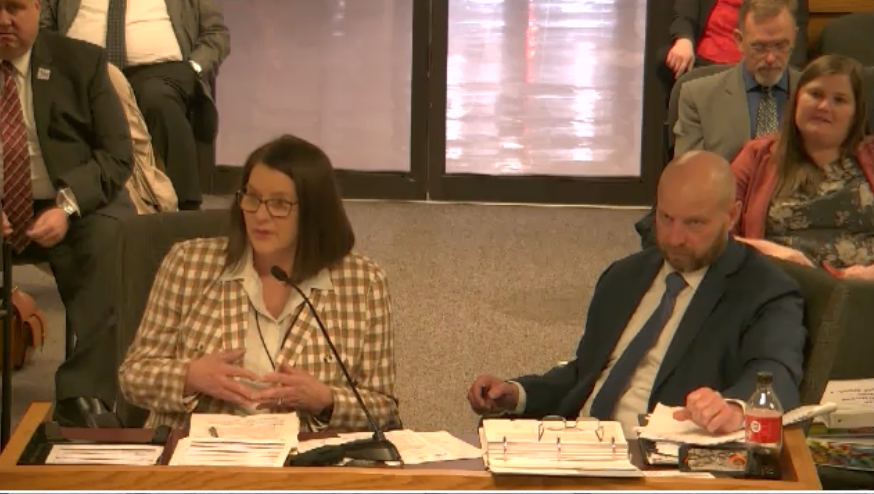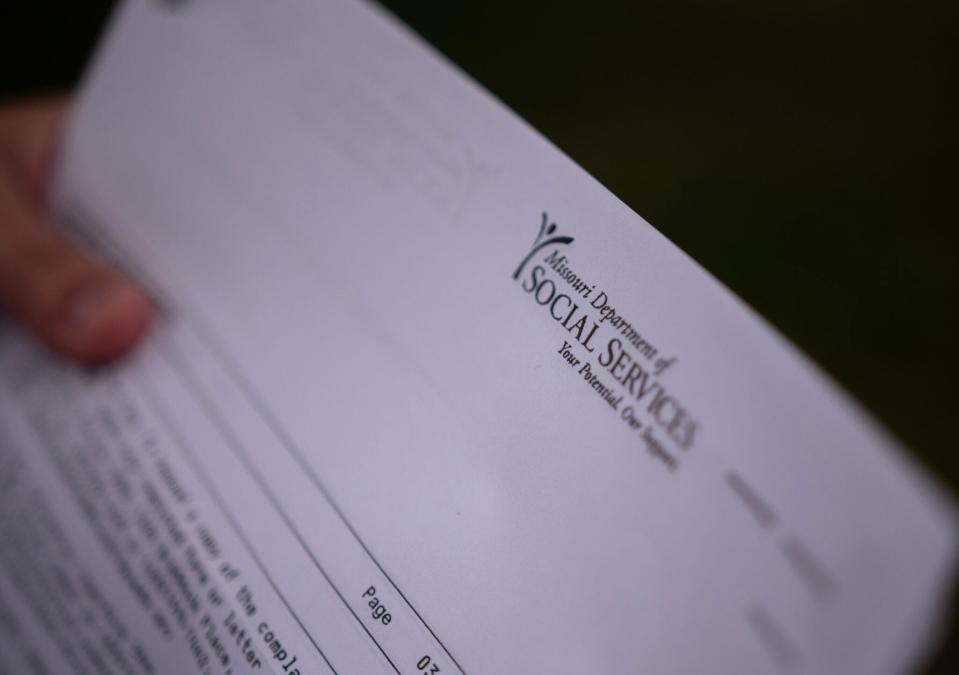Records show rising call center wait times for Missouri Medicaid, food assistance
Missourians in need of help accessing public benefits saw wait times for the state’s long-overloaded call center increase in the final months of 2023.
The average hold time for the state phone line dealing with food assistance interviews reached one hour and 12 minutes in December, more than double what they had been in August, according to records obtained by The Independent under Missouri’s Sunshine Law.
A pending federal lawsuit filed two years ago, when wait times were up to three hours, argues long hold times for required food assistance interviews constitutes an illegal denial of benefits.
For the state’s phone line dealing with general questions — including about programs such as Medicaid, temporary assistance for needy families and the child care subsidy — wait times exceeded one hour and 45 minutes in December. That number has crept up every month since August.
Many callers give up before they ever get to talk to a person.
Records show 72% of callers hung up before reaching a representative when calling the general line in December, and 35% abandoned calls for the line for Supplemental Nutrition Assistance Program interviews, previously known as food stamps.
“If you are working, where are you going to wait on hold for an hour and 45 minutes?” state Rep. Deb Lavender, a Manchester Democrat, told The Independent. “If you’re not working, you probably have some reason that’s preventing you from working, including perhaps watching kids. That’s not manageable for any of us these days.”
At several junctures over the last few years, the state has argued it was making progress at lowering wait times or was on the cusp of doing so — pushing to hire and train more staff, grant overtime, move to automate assistance and contract with private call centers.

At a House budget committee hearing for the social services department in early December, Lavender pressed Kim Evans, director of the agency’s Family Support Division, on whether SNAP interviews were being done in a timely manner.
“I was excited this morning,” Evans testified, “when we first came into the hearing, we were at an 11 minute wait time.”
Lavender responded that she was also excited that wait times were down to only 11 minutes, but “I’ve also been in hearings with you before that you told me we’re getting better at wait times, and then in between I keep hearing about hellacious wait times.”
During that December hearing, records show the prior month average was actually one hour and 19 minutes. The average for the month of December ended up being over an hour as well.
The department didn’t respond to several questions attempting to clarify how Evans calculated that day’s wait to reach 11 minutes. Baylee Watts, a spokesperson for the Department of Social Services, said in an email to The Independent that “times can widely vary throughout the month.”
More: Medicaid eligibility verification drops 32,000, including 16,000 kids, from benefits
In another budget committee hearing Tuesday, Lavender again pressed Evans on the wait times.
“Every time we’re in here, you tell me our call times are getting better,” Lavender said, “and every time I step out of this room and talk to anybody else they tell me call times are still terrible.”
Evans said the wait time for those in need of assistance “fluctuates.”
“We’re coming out of open enrollment for the federal marketplace right now, so we are backlogged in applications, so folks are calling us,” she said. “We’re unwinding renewals, people are calling us. We are seeing an influx in SNAP applications, people are calling us. And so, you know, as the economy goes, so does our call center. As the weather goes, so does our call center.”
The state is asking for $4 million for a “call center bot,” to increase automation and reduce the need for staff on the general call center line.
The goal is to free up 100 staff who are currently answering the general questions calls to transfer them to SNAP interviews instead, by having a virtual agent to “tackle those calls and those long wait times on tier three,” Director Robert Knodell told lawmakers Tuesday, referring to the SNAP interview tier.
Knodell said if implemented it would be a “game changer.”
"Disappointing for the people in our state"

In a January letter to The Independent, DSS’ deputy director of operations, Teri Armistead, wrote that Family Support Division “continues to execute on strategies, such as blitzes,” which shift workers between processing applications and answering calls depending on need.
“This has resulted in significant improvement to our call center wait times,” she wrote.
In an interview with The Independent last week, Lavender said she’s “just so disappointed.”
“It feels like we continuously talk about SNAP wait times,” she said, “and why we haven’t been able to solve this is just so disappointing for the people in our state who need to rely on these services … I don’t think we’ve ever gotten accurate information in budget committee about what true wait times are.”
Delayed or missing SNAP benefits born out of the dysfunctional call center looks like families struggling to feed their young children while rearranging their days to wait on hold, Missourians with disabilities who can’t understand the application forms being unable to get help and some subsisting on little food while using up prepaid phone minutes on hold.
More: Lawmakers hope to address child care crisis with three-pronged tax credit package
It’s not just those seeking SNAP interviews who bear the cost — people on a range of benefits programs encounter issues enrolling in or maintaining their services and then call and can’t get through. Sometimes when they go to in-person resource centers, they are directed back to the same troubled call center for help.
The general questions line — which reached an almost two-hour wait in December — is where many people with Medicaid issues end up.
Last year, Missouri was one of 16 states the federal Centers for Medicare & Medicaid Services flagged, writing that long wait times and high abandonment rates for calls “are impeding equitable access to assistance and the ability for people to apply for or renew Medicaid.”
Missouri argued at the time that CMS was misunderstanding state data. Callers to the state who have Medicaid questions can end up in the state’s general questions tier — which generally has long wait times — or one of two contracted-out lines.
The state works with two private companies, Automated Health Services and Wipro, that answer calls for a limited subset of Medicaid queries that don’t require the authority of state staff. They have shorter wait times — 26 minutes for AHS in October and one minute for Wipro — but by far the largest volume of Medicaid-related calls ends up in the state’s general questions line.
The contracted lines can handle annual renewals done by phone, order replacement Medicaid cards and handle reported changes, according to Watts.
The state has generally characterized callers as making the wrong choices, which lead to them being in the general questions line rather than the more-efficient contracted lines — though callers have told The Independent the contracted lines often aren’t equipped to answer their questions, including about the status of an application submitted months prior.
“… We strongly encourage Medicaid participants to utilize the Medicaid lines to free up resources for SNAP and [temporary assistance],” Watts said.
One advocate helping with a Medicaid application that hadn’t been processed for months, directed to Medicaid from the federal Marketplace Exchange, sent The Independent a screenshot of her call Feb. 1 to the agency that lasted 6 hours. She said she was speaking to the representative for just 30 minutes of that time.
This was the fourth call this year, with the previous ones also involving hours-long waits.
"This is going to be a cycle"

In addition to increasing call-center wait times, the state’s processing time for Medicaid applications has been rising, exceeding the federal limit in December.
It took a median time — the metric DSS is required to report to the federal government — of 49 days in December to process a Medicaid application for the group that includes most low-income Missourians, Watts said.
Federal rules limit processing time for those applications to 45 days.
One pregnant applicant previously told The Independent she had to postpone getting prenatal care because her Medicaid application was taking months to be processed.
In a report published by the federal Centers for Medicare and Medicaid Services in January, Missouri’s percent of applications in October processed outside the federal limit was 34%. Only three states were worse. The abandonment rate for Missouri in October, referring to calls abandoned before reaching a representative, was 47%, second only to Nevada.
More: With monetary prize ban, Springfield outlaws video lottery terminals within city limits
“It is always the goal of the Family Support Division to provide excellent customer service while working as efficiently as possible,” Armistead said. “There are, however, very real limitations related to capacity that they must navigate,” citing limited staff call centers, processing and working in person, along with limits on hours those staff can work in the system.
The confluence of Medicaid renewals beginning again, an increase in SNAP applications and the opening of federal enrollment “can and does impact processing times,” she said.
Now that open enrollment is over, Armistead said, applications should start to “slow down and we will start to work through the backlog. This will happen every year from November through January.”
Evans said Tuesday, about the call wait times increasing in recent months, that “this is going to be a cycle, you’re going to see with (Family Support Division), that’s going to happen.”
Lavender responded: “I hope there’s an end of this.”
“I don’t think I’ve sat in a budget meeting yet, and this is the end of my sixth year, that we haven’t talked about long wait times for one reason or another.”
This story was first published at www.missouriindependent.com.
This article originally appeared on Springfield News-Leader: Call center wait times lengthy for Missouri Medicaid, food assistance

